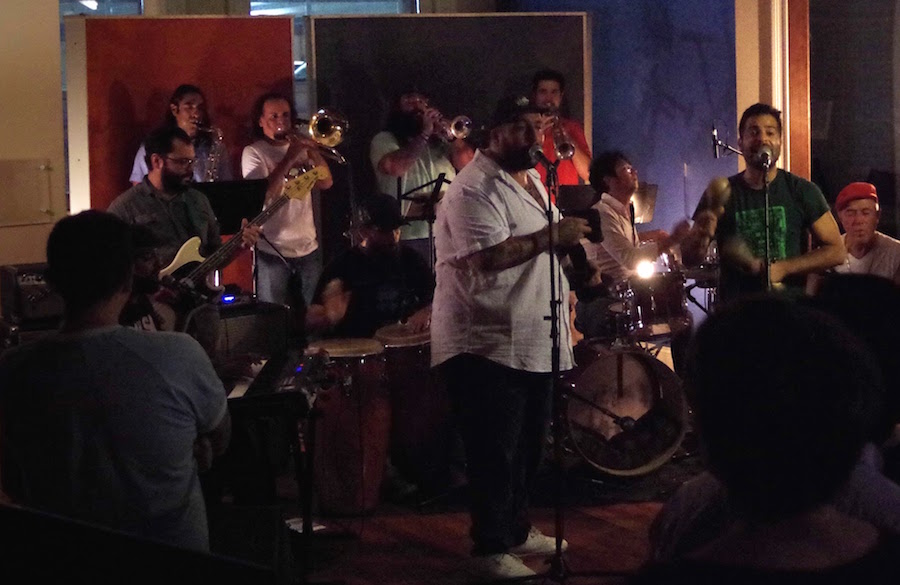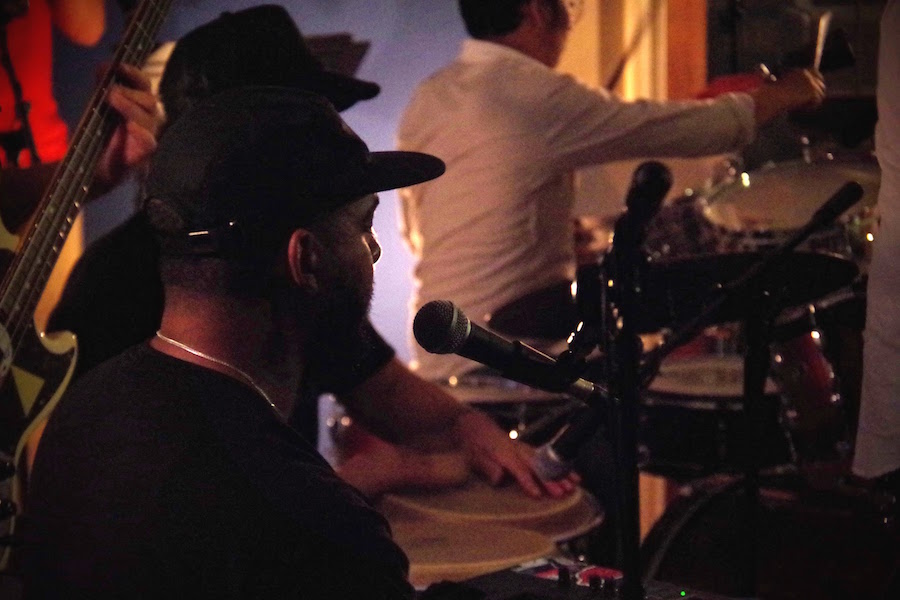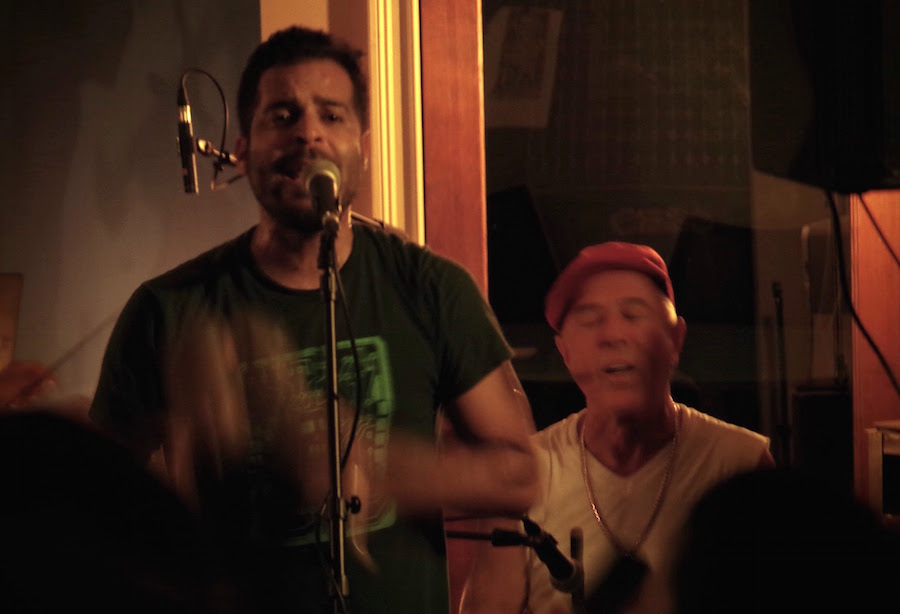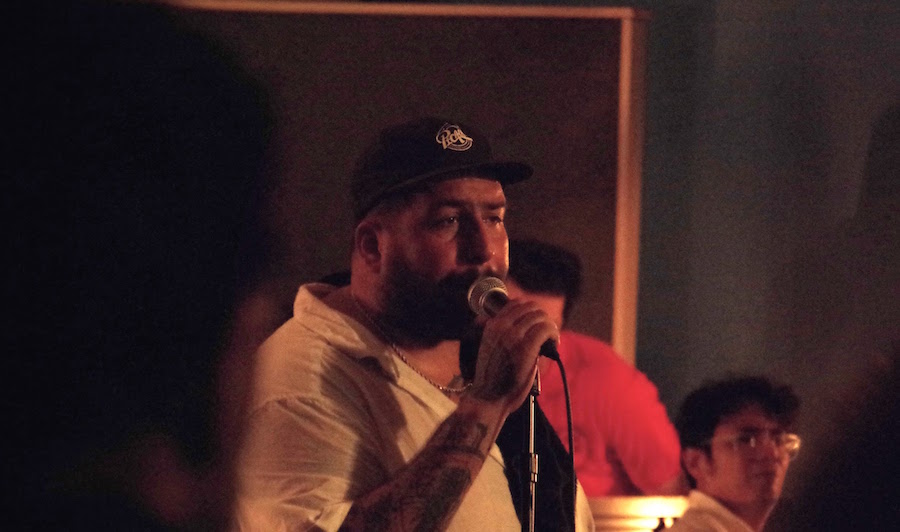
Gabriel Mortali Photos.
“Otra, otra, otra, otra!” The music had stopped before the audience was ready, and it didn’t look like the band had had it in mind to do an encore. Trumpets had been lowered from lips, players’ backs were turned, the microphone was off. The beaming, sweating assembly was content, but not quite satisfied. There had to be one more. The concert could not end; there was more work to do. It was the longest pause in sound since a 15-second break about an hour before.
It was the scene Saturday night, as The State House—not yet officially in its own venue—welcomed Puerto Rican band Orquesta el Macabeo to The Grove coworking space on Chapel Street. With propulsive, nonstop rhythm, the band kept the crowd on its feet through the end of the night—and spoke to collaboration at its best.
By 9 p.m., people had begun climbing the staircase up to the main co-working area of The Grove, where Firehouse 12's Mark Scialabba greeted them with spinning records. In anticipation they moved, not towards the beer table, but with one another, feet sliding back and forth over the old wood floor.

It was a fitting overture to Orquesta el Macabeo. Salsa is a music of anticipation, captured in the arrival of the bass note half a beat before the down beat of a song. In the air was music as used to be listened to, with the crackle of a needle and good company. As it played through the monitors, the conversation grew to fill the room to its brim, and it vibrated.
The microphone echoed, “Buenos noches.”
Amidst cheers and whistles, lead singer Luis De La Rosa Solá began with humble thanks to the hosts and to the those in attendance. Through Aníbal Vidal Quintero fingers, notes from the keyboard slid in along the bending of the pitch wheel. The audience chatter continued but the room was changed, and then came José Ibáñez' bass, and then nothing.
A flurry of hits to the hide and the bronze cymbals rang, and the train left the station. All aboard. All in motion. They delivered an immediate fix, so clearly needed that there was no hesitation in the audience. The music is meant for movement, and it happened so naturally that there was no awkward breaking of the ice that so commonly occurs at rock, or even jazz shows.

Orquesta knew the way, and an audience of nearly 50 people followed without missing the beat. Mya, a self-proclaimed wallflower, stepped away from the vertical surface, and out onto the horizontal one.
There is power in the music of Orquesta el Macabeo—the true kind that is averse to definition. It is from 70 years of salsa music’s history, and the styles from Africa and Cuba that blended to inspire it. It is in the eclectic musical roots of those who make up the group–punk, ska, and reggae among many others. It is in the lively, rhythmic, meandering calls from the vocal leader, harmonized responses from the choir, and the punching, reflective, affecting refrains from the horn section.
The percussion is at once wild and calculated; a visceral blend of sticks and palms. It is inside the players, and it is inside those who hear, those who feel. As the music played, not one person was without a tapping foot or finger, swaying hips, closed eyes and smiles, and most were at least once completely overcome with movement. Couples stepped in time, touched prancing palms, spun, caught, and clutched one another around the waist. Friends laughed, tried out their moves, and traded partners.

As the music rose to altitude, the boundary between participant and bystander dissolved. Solá wiped his brow. Ibarra let his maracas rest, stepped out onto the dance floor and joined show-goer, Amanda, during one of the night’s most levitating moments. Cheers and laughter came from both the audience and the players—even from Travis, who had accompanied Amanda that night.
The two New Haven locals, like many others there, had not heard the group before. But they heard it was going to be good, so they showed up.
So did Upton, who plays guitar in New Haven-based punk band, Syntax . As he observed the vintage Fender equipment that delivered the sounds of the bass and the keys, and reacted to the power and sharpness of the horn section, he also mused about the energy of the audience. Everybody was moving, dancing, clapping, singing,
“It was just perfect,” he said.